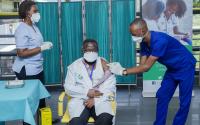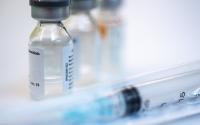[ad_1]
While uncommon, COVID-19 reinfections happen, especially in people 65 years and older—underscoring the importance of continued physical distancing and prioritization for vaccines even in previously infected people, a large observational study yesterday in The Lancet suggests.
Researchers at the Statens Serum Institut in Copenhagen, Denmark, analyzed data on 10.6 million SARS-CoV-2 tests from 4 million Danes (69% of the population) from that country’s second COVID-19 surge, from Sep 1 to Dec 31, 2020. They then compared them with infection rates from residents with positive or negative tests during the first surge, March to May, 2020.
Before June 2020, 533,381 residents were tested, of whom 2.20% were positive for COVID-19. Of the 525,339 people eligible for follow-up during the second surge, 2.11% were infected during the first surge, and 0.65% tested positive again. In comparison, 3.27% of the 514,271 who had tested negative during the first surge were infected (adjusted relative risk [aRR], 0.195). Protection against reinfection was 80.5%.
An alternative cohort analysis of COVID-19 infection rates throughout the year in those with a previous infection versus without one 3 months previously or more generated similar estimates (aRR, 0.212), for a protection of 78.8%. Among residents 65 years and older, however, observed protection against reinfection was only 47.1%.
Older people, the researchers said, may be more likely to be reinfected due to age-related waning of immunity, disrupted coordination of coronavirus-specific T-cell responses, and scarcity of naïve T cells, which have been linked to aging and poor COVID-19 outcomes.
Table of Contents
‘Natural protection cannot be relied on’
There was no difference in estimated protection against reinfection by sex (78.4% in men vs 79.1% in women) or evidence of fading protection over time (79.3% at 3 to 6 months follow-up vs 77.7% at 7 months follow-up or more). The study involved only the original coronavirus strain; variants were not evaluated.
In a sensitivity analysis of a sample restricted to 15,604 physicians, nurses, social workers, and healthcare assistants, who were tested a median of 10 times in 2020, 658 (4.2%) of whom tested positive during the first surge. Of those 658, 1.2% were reinfected during the second surge, compared with 6.2% of those who tested negative during the first surge (aRR, 0.189; estimated protection against repeat infection, 81.1%).
“Because the older age group is more prone to a serious clinical course of illness, this finding highlights the need to implement protective measures for the older population in the form of effective vaccines and enhanced physical distancing and infection control, even in those known to be previously infected,” they wrote.
Study coauthor Steen Ethelberg, PhD, said in a Lancet press release that their findings could inform policies about vaccination strategies and the relaxing of public health restrictions. “Since older people are also more likely to experience severe disease symptoms, and sadly die, our findings make clear how important it is to implement policies to protect the elderly during the pandemic,” he said.
The authors said that a better understanding of the degree and length of protection, as well as the mechanisms of immunity, against repeat coronavirus infection is critical to formulating optimal intervention strategies. “Our data indicate that vaccination of previously infected individuals should be done because natural protection cannot be relied on,” they wrote.
The release calls it the first large-scale study of its kind.
Vaccination is ‘enduring solution’
In a commentary in the same journal, Rosemary Boyton, MBBS, and Daniel Altmann, PhD, of Imperial College London, said that the quality and durability of protection produced by natural COVID-19 infection are weaker than the higher concentrations of neutralizing antibodies generated by currently available vaccines—a finding complicated by coronavirus variants able to escape both natural and vaccine-induced immune response.
“Interestingly, vaccine responses even after single dose are substantially enhanced in individuals with a history of infection with SARS-CoV-2,” they said. “These data are all confirmation, if it were needed, that for SARS-CoV-2 the hope of protective immunity through natural infections might not be within our reach, and a global vaccination programme with high efficacy vaccines is the enduring solution.”
[ad_2]
Source link












